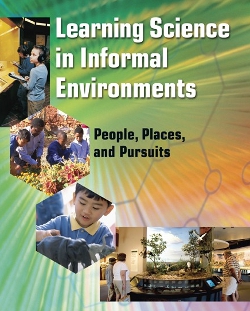Publication: Research on Informal Learning
 The National Academies Press has published an extensive study called Learning Science in Informal Environments: People, Places, and Pursuits (2009), which can be read online for free, or ordered in hardcopy or as a pdf. It explores the various facets of science learning outside the classroom and uses research to determine which approaches are most effective.
The National Academies Press has published an extensive study called Learning Science in Informal Environments: People, Places, and Pursuits (2009), which can be read online for free, or ordered in hardcopy or as a pdf. It explores the various facets of science learning outside the classroom and uses research to determine which approaches are most effective.
The Committee on Learning Science in Informal Environments was established to examine the potential of non-school settings for science learning. The committee, comprised of 14 experts in science, education, psychology, media, and informal education, conducted a broad review of literature. It assessed the evidence of science learning across settings, learner age groups, and over varied spans of time; identifying the qualities of learning experiences that are special to informal environments and those that are shared (e.g., with schools); and developing an agenda for research and development.
Each year, Americans explore and learn about science by visiting informal learning institutions, participating in programs, and using media to pursue their interests. Thousands of organizations dedicate themselves to developing, documenting, and improving science learning in informal environments for learners of all ages and backgrounds. They include informal learning and community-based organizations, libraries, schools, think tanks, institutions of higher education, government agencies, private companies, and philanthropic foundations. Informal environments include family discussions at home, visits to museums, nature centers, or other designed settings, and everyday activities like gardening, as well as recreational activities like hiking and fishing, and participation in clubs.
One specific section of the research focuses on field trips.
Visit the Website to read Learning Science in Informal Environments: People, Places, and Pursuits (2009) online (free), or order it the hard copy or pdf versions.
The study’s bibliography of sources includes :
- Abler, T.S. (1968). Traffic patterns and exhibit design: A study of learning in the museum. In S.F. DeBorhegyi and I. Hanson (Eds.), The museum visitor (vol. 3, pp. 103-141). Milwaukee, WI: Milwaukee Public Museum.
- Barnard, W.A., and Loomis, R.J. (1994). The museum exhibit as a visual learning museum. Visitor Behavior, 9(2), 14-17.
- Borun, M., Chambers, M., and Cleghorn, A. (1996). Families are learning in science museums. Curator, 39(2), 123-138.
- Crowley, K., and Callanan, M. (1998). Describing and supporting collaborative scientific thinking in parent-child interactions. Journal of Museum Education, 17(1), 12-17.
- Gutwill, J. (2003). Gaining visitor consent for research II: Improving the posted sign method. Curator, 46(2), 228-235.
- Leinhardt, G., and Knutson, K. (2004). Listening in on museum conversations. Walnut Creek, CA: AltaMira Press.
- Parsons, C. (2007). Web-based surveys: Best practices based on the research literature. Visitor Studies, 10(1), 13-33.
- Serrell, B. (1998). Paying attention: Visitors and museum exhibitions. Washington, DC: American Association of Museums.
- Serrell, B. (2001). In search of the elusive bimodal distribution. Visitor Studies Today, 4(2), 4-9.
- Shettel, H.H. (1997). Time—is it really of the essence? Curator, 40, 246-249.
- Storksdieck, M. (2007). Using web surveys in early front-end evaluations with open populations: A case study of amateur astronomers. Visitor Studies, 10(1), 47-54.
- Yalowitz, S., and Ferguson, A. (2007). Using web surveys in summative evaluations: A case study at the Monterey Bay Aquarium. Visitor Studies, 10(1), 34-46.
Filed under: Web Resources
Tags: Internet Resources, Museums, National Academies of Sciences, Publication, Research on Learning, Web Resources








